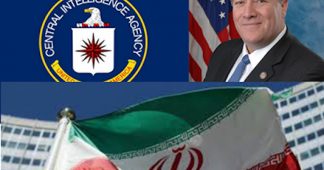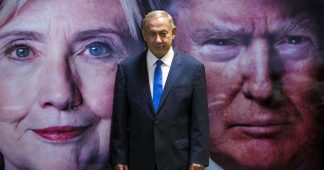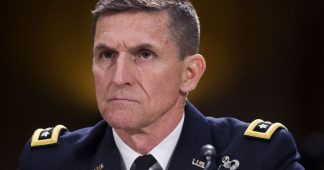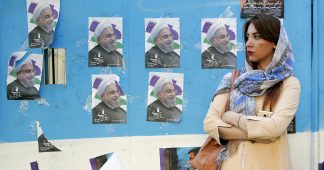By Jordan Shilton
US President Donald Trump issued an ominous warning to Iran on Friday, declaring in a White House statement that his administration is “prepared to impose serious consequences” if Tehran fails to release detained American citizens. This provocative declaration marks a further ramping up of tensions between Washington and Iran, which the US ruling elite has long decried as a major obstacle to its unchallenged primacy over the energy-rich Middle East.
Trump’s bellicose remarks came just days after he reluctantly agreed to certify Iran’s compliance with the terms of the 2015 nuclear accord, the Joint Cooperative Plan Of Action (JCPOA), negotiated under the Obama administration. The deal promised a normalization of economic relations with the West in exchange for Iran dismantling large parts of its civil nuclear program, freezing others, and accepting an onerous inspection regime. However, the US president must certify Iranian compliance to Congress every 90 days; otherwise punishing US sanctions, based on America’s central position in the world banking system, “snap-back” into force.
Even as Trump granted a further 90-day extension, he stepped up pressure on Iran by pledging to enforce stricter monitoring of the deal. On Tuesday, the Trump administration seized on Iran’s ballistic missile program to implement economic sanctions against several individuals and organizations, including two groups associated with the powerful Revolutionary Guards (IRGC).
In leaks to the media, anonymous sources pointed to a bitter conflict raging within the administration over its Iran policy. According to the New York Times and Foreign Policy, Trump was irate with his advisers, including Secretary of State Rex Tillerson, for not presenting him with the option last Monday of decertifying Iran’s compliance with the nuclear deal. One source said that Trump had demanded of Tillerson in April, when he granted his first approval for deal’s the continuation, that he lay the groundwork for a decision to decertify this time around.
According to a Foreign Policy source, Trump, not trusting Tillerson, has now appointed a committee of White House staffers to draft a proposal to scuttle the nuclear deal, removing responsibility from the State Department. The president has reportedly insisted that when the next 90-day approval comes due in October, he wants to be in a position to claim that Tehran has failed to live up to its JCPOA commitments, so he can justify refusing to grant the waiver under which the sanctions are suspended. The push for the immediate abandonment of the Iran deal is reportedly being led within the White House by Trump’s fascistic chief political adviser Stephen Bannon.
Washington’s repudiation of the nuclear agreement would place the US and Iran on a short-track to a war that would likely envelop most of the Middle East and potentially involve other great powers. In arguing for the JCPOA, US President Obama repeatedly argued that for US imperialism the only alternative to a nuclear deal with Iran is war.
The internecine warfare within the Trump administration is bound up with the deepening crisis confronting US imperialism in the Middle East. More than a quarter century of bloody military violence has failed spectacularly to reverse Washington’s economic decline and consolidate its hegemony over the world’s most important oil producing region. Wars in Iraq, Afghanistan, Libya, and Syria, as well as US-backed conflicts in Yemen and Somalia, have claimed the lives of millions and laid waste to entire societies. With its extensive military support to its two main client states in the region, Israel and Saudi Arabia, Washington also bears responsibility for the brutal suppression of the Palestinian people and increased sectarian divisions throughout the Middle East.
Trump, together with hard-right sections of the Republican Party, speak for the faction of the American ruling class seeking all-out war with Iran. He denounced the nuclear accord during the presidential election campaign as the worst deal ever and has repeatedly ratcheted up tensions since taking office. In May, he delivered an aggressive denunciation of Iran in a speech in Riyadh, endorsing the Saudis’ efforts to forge a US-backed Sunni military alliance to confront Iran. Emboldened by this declaration, Saudi Arabia, with Trump’s explicit endorsement, rallied its regional allies some two weeks later to impose an all-out diplomatic and economic blockade of Qatar that stopped just short of war. Riyadh is demanding that Doha make sweeping foreign policy concessions, including downgrading its ties with Iran, and shelving its funding of groups like the Muslim Brotherhood and Hamas.
Unlike Trump, Tillerson and Secretary of Defense James Mattis have given no encouragement to the blockade the Saudis, serval other Gulf states, and Egypt have imposed on Qatar. Over the past seven weeks they have been working for a diplomatic solution to the dispute, while making clear that they think the Saudis are the ones who should do most of the backing down.
This is motivated in part by Qatar’s crucial strategic role as home to two giant US airbases as well as the forward base of the Central Command, which conducts the wars in Afghanistan and Syria/Iraq. Tillerson and Mattis are also concerned that the stoking of tensions among its Gulf client states will get in the way of their plans for a broader US intervention in Syria. Similar reasoning lies behind their opposition to Trump’s plot to scuttle the nuclear agreement, at least in the current conjuncture.
In Syria, where the US incited a civil war with the aim of ousting the pro-Iranian and pro-Russian Assad regime in Damascus, the war is increasingly developing into a regional struggle for power. As Islamic State loses ground in Syria’s east, Washington is moving decisively to block the establishment of a land bridge from Tehran through Syria and into south Lebanon that would enable Iran not only to supply Assad, but also its ally Hezbollah. To this end, US and British Special Forces are training Sunni Islamists at a military base on the Syrian-Jordanian border, while allowing defeated ISIS fighters in Raqqa to move south to confront pro-Assad troops in the province of Deir ez-Zor.
Washington’s immediate goal in this reckless agenda is to push back Iranian influence, while at the same time establishing a fighting force on the ground that can be thrown into a sectarian struggle for power against the Assad regime at the first appropriate opportunity. The Trump administration’s ending of the program funding al-Qaida-linked Syrian rebels, combined with the recently unveiled ceasefire agreement with Russia in Syria’s south, amounts to an attempt to drive a wedge between Iran and Russia as part of the preparation of a direct military conflict with Iranian forces in Syria.
While the US political establishment, Republican and Democratic alike, is determined to ultimately bring Iran to heel, there are deep divisions over how this can best be achieved and how this figures in the broader drive for US world hegemony.
Scuttling the Iran nuclear deal and putting the US on the fast-track to an all-out war with Iran would, argue powerful sections of the ruling elite, dangerously distract from America’s military-strategic offensives against Russia and China.
A July 20 editorial in the New York Times—which has been at the forefront of the hysterical anti-Russia campaign that is aimed at forcing Trump to continue and escalate Obama’s hardline stance towards the world’s second largest nuclear power—argued that the US should pursue regime change in Tehran by means other than conquest. “Iran’s government,” it declared, “continues to be torn between anti-American hard-liners and moderates like President Hassan Rouhani who are willing to engage with America. Mr. Trump would make a grave mistake if instead of trying to work with those moderate forces he led the nation closer to war.”
A significant consideration behind the opposition of Tillerson, Defence Secretary James Mattis and the Times’ editorialists to the US repudiating the Iran nuclear deal is the hostile response this would provoke from Europe, above all Germany and France. The European imperialist powers have gone much further than Washington in developing economic ties with Iran since 2015, as shown recently by the conclusion of a $1 billion investment agreement between France’s oil giant Total and Tehran to develop a large gas field jointly operated with Qatar. It was also displayed in the differing responses to the Saudi-led blockade of Qatar. While Trump enthused over Riyadh’s tough stance against “terrorism,” German Foreign Minister Sigmar Gabriel pointedly attacked the “trumpification of relations” in the region and urged that all parties be included in a negotiated settlement.
With considerable justification, Iranian officials have charged the Trump administration with already violating the terms of the JCPOA, both by imposing additional sanctions (purportedly targeting Iran’s missile program) and by attempting to discourage foreign companies from doing business with the country. The 2015 deal stipulates that the US refrain from taking measures to prevent the normalization of economic relations with Iran.
In a move that will further irritate the Trump administration, Iranian media reported Sunday that Iran and Iraq have concluded a joint military agreement to deepen the fight against terrorism. Large numbers of Iranian fighters, including military commanders, have long operated in Iraq in alliance with Baghdad’s Shiite-dominated regime and played a significant role in the recent bloody siege and capture of Mosul.











